|
|
|
Sort Order |
|
|
|
Items / Page
|
|
|
|
|
|
|
| Srl | Item |
| 1 |
ID:
086431
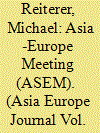

|
|
|
|
|
| Publication |
2009.
|
| Summary/Abstract |
Since its inception in 1996 ASEM has provided an opportunity for focussing relations between the EU and East Asia as a forum for informal multilayered dialogue and building a framework for enhanced cooperation in the political, economic and social/cultural fields. Inter-regionalism, of which ASEM is the incarnation in the EU-Asia relationship, developed into an important policy tool of the EU in an effort to maintain a multipolar setting. Regional identities in Asia are at a different level when comparing South East Asia, North East Asia, East Asia and South and Central Asia. ASEM contributed to a certain extent to the region building in East Asia. Although the economic pillar of ASEM turned out to be the more important one when compared to the political and the people-to-people pillars, it will not become the basis for a (deep) inter-regional free trade agreement because of the diversity of the Asian members, reinforced by the last ASEM enlargement. However, turning weakness into strength, ASEM could become the EU's vehicle for a more holistic approach to Asia thereby fostering a more economic and political multipolar world order. The financial melt down of the international financial order lead to the rediscovery of the need for international cooperation not only on the level of business but also among states. Making use of ASEM, developed over the last 12 years, could provide the much needed platform in the EU-Asia relationship.
|
|
|
|
|
|
|
|
|
|
|
|
|
|
|
|
| 2 |
ID:
098797
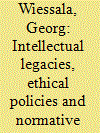

|
|
|
|
|
| Publication |
2010.
|
| Summary/Abstract |
This article investigates EU foreign policies regarding Human Rights with Asia. The perspective adopted here argues for a consideration of selected, social-constructivist, perspectives. The article emphasizes ideas, identities, values, educational exchange and human rights in EU policy towards Asia. Through a number of case studies, the article demonstrates that there is both an 'enabling' and an 'inhibitory' human rights dynamism in EU-Asia dialogue. The article suggests some ways of translating this into policies. It proposes a more inclusive, 'holistic', understanding of human rights discourse in East-West relations.
|
|
|
|
|
|
|
|
|
|
|
|
|
|
|
|
| 3 |
ID:
112868
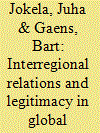

|
|
|
|
|
| Publication |
2012.
|
| Summary/Abstract |
This article explores the ramifications of the European Union's (EU) internal legitimacy debate for its external relations. It applies the Asia-Europe Meeting (ASEM) as a case study to examine the EU's attempts to promote legitimacy in global governance, more specifically in interregional institutions. The article's theoretical framework draws from the EU's legitimacy debate. It identifies three key sources of legitimacy, namely, (i) input legitimacy or democratic control and accountability, (ii) output legitimacy or performance and achievement of core purposes, and (iii) the degree of common identity as externalised through collective representation and the articulation of shared norms and values. The empirical analysis thereafter leads to three observations. First, the EU's presence has contributed to an increased democratic involvement by ASEM's different stakeholders including parliaments and civil society. Second, purely from an institutional legitimacy perspective ASEM achieves its purpose as a forum to 'constructively engage' with Asian countries and address issues relating to global governance. Third, ASEM reveals the EU's dual identity as an intergovernmental grouping and an organisation with a gradually increasing capacity of collective representation. However, the advancement of the EU's normative objectives through ASEM has been problematic, leading to a more interest-based and pragmatic policy path. The article concludes that the EU's legitimacy debate has had a bearing on relations with Asia and, in particular, with ASEM. Importantly, and given the EU's setbacks, some elements of the 'EU's way' have proven successful in promoting democratic notions of legitimacy beyond the state.
|
|
|
|
|
|
|
|
|
|
|
|
|
|
|
|
| 4 |
ID:
129397
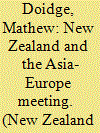

|
|
|
| 5 |
ID:
121579
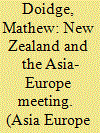

|
|
|
|
|
| Publication |
2013.
|
| Summary/Abstract |
This article considers New Zealand's accession to the Asia-Europe Meeting, considering both its formal path to membership and the evolving calculus by which its views of the process were structured, focusing on elements such as the enabling context provided by a change of national government in 2008, the impact of the global financial crisis and the position of Australia. Drawing on a set of interviews undertaken within the New Zealand Ministry of Foreign Affairs and Trade, it goes on to examine perceived benefits of the Asia-Europe Meeting for New Zealand, and the extent to which these have been achieved. Finally, it addresses the issue of a New Zealand ASEM strategy, outlining potential areas for future engagement.
|
|
|
|
|
|
|
|
|
|
|
|
|
|
|
|
|
|
|
|
|